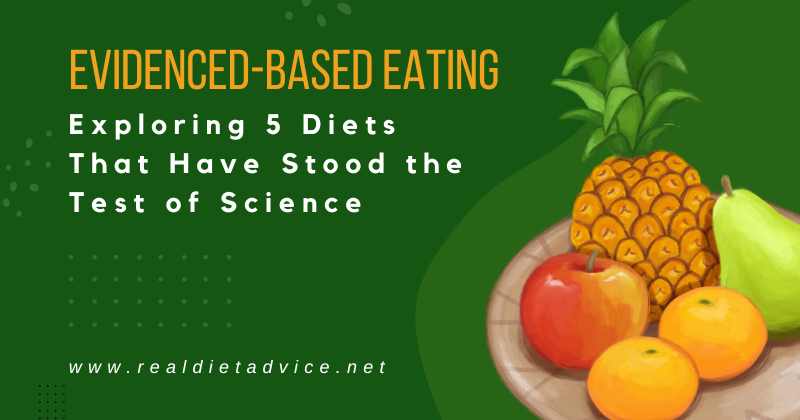In an ever-evolving landscape of nutritional advice, five diets have consistently proven their value in scientific studies: the Low-carb diet, the Whole-food diet, the Mediterranean diet, the Paleo diet, and the Vegan diet. Each promotes a unique approach to healthful eating, tackling various health outcomes from weight management to disease prevention. This article, “Evidenced-Based Eating: Exploring 5 Diets That Have Stood the Test of Science,” delves into the core principles of these diets, substantiated by research and proven to deliver results. We will also touch on the Gluten-free diet, highlighting its benefits beyond catering to those with gluten intolerance. We aim to provide you with the knowledge to make informed dietary choices, focusing not just on temporary results, but on long-term wellness. Remember, the most successful diet is one that aligns with your lifestyle and preferences, making it sustainable for years to come.
Finding a diet you can stick with is the key.
Here are Five Healthy Diets that have been Scientifically Proven Effective:

Low-carb, whole-food diet
The whole-food, low-carb diet will help you lose weight and improve your health.
You can adjust your carbohydrate intake according to your goals.
This diet is rich in vegetables, meats, fish, fruits, nuts and fats. It’s low in sugars and starches.
The low-carb, whole-food diet prioritizes consuming real, unprocessed foods that are low in carbohydrates. This approach not only aids in weight loss but also enhances overall health and reduces the risk of various diseases, such as type 2 diabetes and cardiovascular conditions. The diet’s flexibility allows you to adjust your carbohydrate intake based on personal health objectives, making it adaptable and easy to follow.
Key elements of the diet include ample servings of vegetables, meat, fish, eggs, fruits, nuts, and healthy fats. These nutrient-dense foods provide essential vitamins, minerals, and fiber, which can promote satiety and balance blood sugar levels. The diet significantly limits intake of starches, sugars, and processed foods, as these tend to be high in empty calories and can lead to weight gain and other health issues.
Moreover, a low-carb, whole-food diet encourages mindful eating, a habit that fosters a healthier relationship with food. It inspires awareness of food sources, quality, and nutritional content, enhancing the overall eating experience while promoting healthier choices. By adopting this diet, you’re not just adopting a set of food rules but also embracing a lifestyle that is conducive to long-term health and wellbeing.
Mediterranean diet
The Mediterranean Diet has been extensively studied. It is particularly effective in preventing heart disease.
The emphasis is on foods eaten in the Mediterranean region before the 20th century.
It includes a wide variety of fruits, vegetables, fish, poultry and whole grains.
The Mediterranean diet, one of the most studied dietary patterns globally, has garnered substantial acclaim for its cardioprotective benefits. Rooted in the traditional eating habits of the Mediterranean region during the 20th century and earlier, this diet not only reduces the risk of heart disease but also contributes to longevity and overall well-being.
Central to the Mediterranean diet are copious amounts of vegetables, fruits, fish, poultry, whole grains, and legumes. These foods provide a wealth of nutrients, including heart-healthy fats, fiber, and antioxidants, which collectively foster cardiovascular health. Dairy products are incorporated in moderation, mainly in the form of fermented products like yogurt and cheese that offer probiotics beneficial to gut health.
Extra virgin olive oil, a staple in the Mediterranean diet, is valued for its high monounsaturated fat content. Research has consistently linked these fats to lower levels of ‘bad’ LDL cholesterol and higher ‘good’ HDL cholesterol.
Beyond the food itself, the Mediterranean diet emphasizes the importance of how you eat. It promotes enjoying meals with family and friends, being physically active, and savoring life’s pleasures. Therefore, the Mediterranean diet is more than just an eating plan; it represents a holistic lifestyle that nurtures the body, mind, and spirit while focusing on heart health.

Paleo diet
The Paleo Diet has become very popular and is effective in weight loss as well as improving general health. The paleo diet is the most popular in the world.
The focus is on raw, unprocessed food that was available to our paleolithic forefathers.
The Paleo diet, often referred to as the “caveman” diet, takes its inspiration from the dietary habits of our Paleolithic ancestors who lived thousands of years ago, long before modern agriculture. Today, it is one of the world’s most popular diets, acclaimed for its potential to facilitate weight loss and promote overall health improvement.
The principle of the Paleo diet is to consume whole, unprocessed foods, the kind that our hunter-gatherer ancestors might have eaten. This includes lean meats, fish, fruits, vegetables, nuts, and seeds, which are rich in vital nutrients like protein, fiber, and healthy fats. These foods not only support weight management but also enhance energy levels, improve gut health, and reduce inflammation, thus potentially lowering the risk of chronic diseases.
Conversely, the Paleo diet advises against consuming grains, legumes, dairy, refined sugars, and processed foods. These food groups, introduced during the agricultural revolution, are believed to be less compatible with our genetic makeup and may contribute to various health issues when consumed excessively.
However, the Paleo diet is more than just a list of foods to eat and avoid. It’s a philosophy that encourages us to return to the basics of eating, focusing on high-quality, natural foods. By embracing this ancestral approach to eating, proponents of the Paleo diet aim to promote optimal health and wellbeing in the context of our modern lifestyle.
Vegan diet
In the last decade, the vegan lifestyle became increasingly popular. The vegan diet is linked to many health benefits including weight loss and improved heart health.
Die diet is exclusively based on plant-based foods, and all animal products are eliminated.
The vegan diet, characterized by its strict exclusion of all animal products, has surged in popularity over the past decade. Its plant-centric approach is associated with numerous health benefits, including weight loss, improved heart health, and enhanced blood sugar control.
Central to the vegan diet are whole plant foods like fruits, vegetables, legumes, grains, nuts, and seeds. These foods are naturally rich in fiber, antioxidants, and phytonutrients that help combat inflammation and support overall health. Moreover, they are typically lower in calories and saturated fats, contributing to weight management and cardiovascular health.
While the vegan diet excludes all animal-derived products, including meat, dairy, eggs, and honey, it doesn’t imply a compromise on protein intake. Many plant-based proteins, like legumes, soy products, and certain grains, can adequately fulfill the protein needs of vegans.
Beyond the physical health benefits, the vegan diet is often chosen for ethical and environmental reasons. Adherents commonly cite concerns about animal welfare and the environmental impact of animal agriculture as significant factors in their dietary choices.
However, a vegan diet requires careful planning to avoid certain nutritional deficiencies, such as vitamin B12, iron, and omega-3 fatty acids. Thus, individuals following this diet should consider fortified foods or supplements to meet their nutritional needs. The vegan diet, therefore, isn’t merely a diet – it’s a holistic approach to healthy eating that requires mindfulness and commitment
Gluten-Free Diet
Gluten-free Diet for those who are gluten intolerant. Gluten is a protein found in wheat, barley, and rye.
You should choose whole foods that are naturally free of gluten for optimal health. junk foods are still junk food .
The gluten-free diet, initially designed for those with celiac disease or non-celiac gluten sensitivity, has gained widespread popularity in recent years. It’s centered on the elimination of gluten, a protein found in wheat, rye, and barley, which can trigger adverse reactions in sensitive individuals.
While the gluten-free diet is a medical necessity for some, others adopt it due to perceived health benefits, such as improved digestion and increased energy. However, it’s important to note that a gluten-free diet doesn’t inherently equate to a healthier diet. The key is focusing on whole foods that are naturally gluten-free, such as fruits, vegetables, lean meats, fish, eggs, and certain grains like rice, quinoa, and oats.
The market today offers a wide array of gluten-free products, from bread and pasta to snacks and desserts. However, just because a product is gluten-free doesn’t mean it’s healthy. Many of these products are highly processed and can be high in sugar, unhealthy fats, and artificial additives. Therefore, the phrase “gluten-free junk food is still junk food” underscores the importance of nutrient-dense, whole foods over processed alternatives.
A well-planned gluten-free diet can be nutritionally balanced and promote overall health. However, it requires careful label reading and awareness of potential gluten sources in food. For those who need or choose to follow this dietary approach, the gluten-free diet encourages a more mindful approach to eating, promoting a stronger connection with the foods we consume.
Final Thoughts
There are so many different diets that it is difficult to choose one.
It’s important to know that some eating habits are more scientifically supported than others. If you want to improve your health , or just lose weight , look for diets that have been supported by scientific research.
In conclusion, the exploration of these five diets – the Low-carb, whole-food diet, the Mediterranean diet, the Paleo diet, the Vegan diet, and the Gluten-free diet – underlines the diversity in healthful eating patterns available to us. Each of these diets, backed by scientific evidence, offers unique benefits from weight loss to disease prevention, illustrating that there isn’t a one-size-fits-all approach to nutrition.
A common thread among these diets is their emphasis on whole, unprocessed foods, and mindful eating. Whether it’s the natural simplicity of the Paleo diet, the plant-focused approach of the Vegan diet, or the gluten exclusion in the Gluten-free diet, these dietary patterns encourage us to be more in tune with our food choices and their impact on our health.
Furthermore, these diets remind us that the best diet is not only about the food we eat, but also about sustainability and enjoyment. Whether it’s the heart-healthy Mediterranean diet or the flexible Low-carb, whole-food diet, successful adoption hinges on whether the diet suits your lifestyle, preferences, and health needs.
In essence, “Evidenced-Based Eating: Exploring 5 Diets That Have Stood the Test of Science” reinforces the idea that nutritious eating is multifaceted and personalized. By understanding the principles and benefits of these diets, we can make more informed decisions about our dietary choices, fostering a healthier and more balanced relationship with food.
The five examples listed above are a good place to start.
Recommended Post For You
- Custom Keto Diet Review – The Truth You Need To Know!
- The Quality-First Approach: Uncovering The Ultimate Diet Secret
- Building a Balanced Plate: A Practical Guide to Real Diet Advice for Everyday Eating
- Real Diet Advice: Uncovering Evidence-Based Nutrition Strategies for Optimal Health
- Debunking Diet Myths: A Comprehensive Guide to Authentic Weight Loss Tips
- The Science of Healthy Eating: Cutting Through the Noise of Fad Diets
- Sustainable Weight Loss: Real Diet Advice for Lasting Results and Improved Well-being
